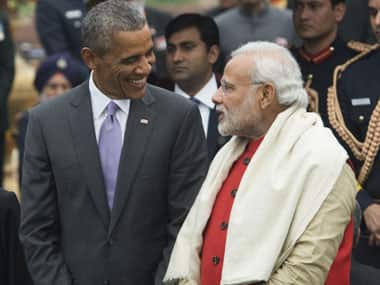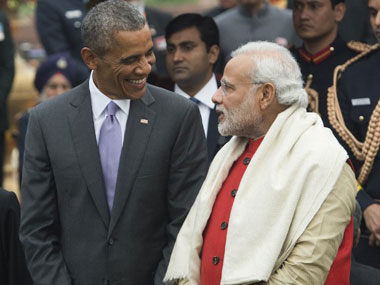As an example of diplomacy reduced to the level of a performance, the Modi-Obama summit was flawless what with those cleverly choreographed bear hugs; the intense walk in the woods by two leaders while TV cameras captured every step they took in the manicured lawns of Hyderabad House; and that chummy tea-for-two moments. It had all the ingredients of a well-scripted reality TV show, each frame – starting with those “spontaneous” arrival scenes – designed to create the maximum impact. And create an illusion of things happening. Of history in the making “live” on television. So, hey presto, the long-standing dispute over the civil nuclear deal was suddenly sorted out over a cup of tea; a flurry of agreements on defence cooperation were decided while they did the walk-around; and then while they were at it they conjured up the idea of setting up a hotline so the two leaders were never a phone call away. [caption id=“attachment_2065737” align=“alignleft” width=“380”]
 Barack Obama with Narendra Modi. AFP.[/caption] We are led to believe that the entire story of India-US relations hangs by the Modi-Obama chemistry. It is all about hugs, intimate telephone calls, and being on first-name basis with “Barack’’. And lest anyone might have missed it, Modi made a point of emphasising it when he appeared with Obama to brief the media. “Barack and I have formed a bond, a friendship. There is openness when we talk on the phone and we also crack jokes… This chemistry has brought Barack closer to me but also brought the people of India and America closer,” he said dismissing conventional diplomacy of “commas” and “full stops”. “I’m fairly new in this area but relations between countries depend less on full stops and commas and more on the chemistry between them. Barack and I have forged a friendship. There is openness when we talk,’’ he said as fawning TV anchors gushed over their crackling “bromance’’. Actually, it is quite a frightening thought that relations between the world’s oldest and the largest democracies hinge only on their leaders’ personal chemistry. What if Modi and Obama were to fall out with each other tomorrow? What if their famed chemistry turned sour for some reason? What then happens to a relationship solely defined by their personal rapport? But, thankfully, that is not the case notwithstanding official claims. There is more to India-US ties than the magical moments in Modi-Obama “jugalbandi’’. Of course, personal chemistry matters in international relations. It is commonsense that if leaders of any two countries get along well it goes a long way in ironing out differences but that’s the limit of it. Ultimately, however, international diplomacy is conducted on the basis of, often conflicting, national interests. And national interests trump friendship. Britain’s Tory prime minister Margaret Thatcher and the then US president Ronald Reagan were known as “political soulmates’’ but they nearly fell out over the 1982 Falklands war when Reagan initially declined to support Britain in its dispute with Argentina over Falkland Islands because it didn’t suit American interests. So, if Obama is reaching out to India it is not because he is pals with Modi but because improving relations with New Delhi is in America’s strategic interests. Just to rewind, the same Obama administration refused visa to Modi when having him on the American soil militated against its policies. There is more than a touch of false arrogance in making claims whose subtext is that but-for-me-it-would-be-deluge. There is also an attempt to rewrite history here by almost suggesting that Modi is the architect of India-US nuclear deal. Remember who signed the original agreement? The man who did it — Manmohan Singh — was neither charismatic, nor were he and George W. Bush chums. Yet, Bush went out of his way to let India into the exclusive club of nuclear powers because it served the American aim of strengthening the non-proliferation regime. As the then head of the International Atomic Energy Agency (IAEA) Mohamed El Baradei put it, it would “bring India closer as an important partner in the non-proliferation regime’’. What brought about that deal was the result of hard-headed and painstaking diplomacy. And this week’s reported “breakthrough’’ in the impasse over the liability issue is also the result of tough backroom negotiations conducted by professional Indian and US diplomats – and not of instant Modi-Obama chemistry. The official line fed to the media that “the two clinched the agreement while taking a 30-minute stroll in the lawns of Hyderabad House after talks had failed to resolve the issue’’, as The Times of India reported, is consistent with the tendency to make everything Modi-centric. In any case, the jury is still out on the “done deal’’ claim, and much work remains to be done to finalise the deal. The announcement that it is all done and dusted, bar the shouting, appears to have been made to burnish the prime minister’s image, and portray it as another proof of the success of “Modiplomacy’’. As I’ve argued before in these columns, under Modi Indian diplomacy has come to centre around one man. Razzmatazz and drama seem to have overshadowed substance and serious long-term policy making. This applies as much to foreign affairs as to domestic issues. Everything seems geared to enhance his image as a strong and decisive leader as compared to his dull and boring predecessor. And that is the nub. Such an approach diminishes the role of hardworking faceless civil servants and diplomats in putting nuts and bolts on their political masters’ vision. Modi, no doubt, is a charismatic and determined leader but the tendency towards building a personality cult is a slippery slope…
Barack Obama with Narendra Modi. AFP.[/caption] We are led to believe that the entire story of India-US relations hangs by the Modi-Obama chemistry. It is all about hugs, intimate telephone calls, and being on first-name basis with “Barack’’. And lest anyone might have missed it, Modi made a point of emphasising it when he appeared with Obama to brief the media. “Barack and I have formed a bond, a friendship. There is openness when we talk on the phone and we also crack jokes… This chemistry has brought Barack closer to me but also brought the people of India and America closer,” he said dismissing conventional diplomacy of “commas” and “full stops”. “I’m fairly new in this area but relations between countries depend less on full stops and commas and more on the chemistry between them. Barack and I have forged a friendship. There is openness when we talk,’’ he said as fawning TV anchors gushed over their crackling “bromance’’. Actually, it is quite a frightening thought that relations between the world’s oldest and the largest democracies hinge only on their leaders’ personal chemistry. What if Modi and Obama were to fall out with each other tomorrow? What if their famed chemistry turned sour for some reason? What then happens to a relationship solely defined by their personal rapport? But, thankfully, that is not the case notwithstanding official claims. There is more to India-US ties than the magical moments in Modi-Obama “jugalbandi’’. Of course, personal chemistry matters in international relations. It is commonsense that if leaders of any two countries get along well it goes a long way in ironing out differences but that’s the limit of it. Ultimately, however, international diplomacy is conducted on the basis of, often conflicting, national interests. And national interests trump friendship. Britain’s Tory prime minister Margaret Thatcher and the then US president Ronald Reagan were known as “political soulmates’’ but they nearly fell out over the 1982 Falklands war when Reagan initially declined to support Britain in its dispute with Argentina over Falkland Islands because it didn’t suit American interests. So, if Obama is reaching out to India it is not because he is pals with Modi but because improving relations with New Delhi is in America’s strategic interests. Just to rewind, the same Obama administration refused visa to Modi when having him on the American soil militated against its policies. There is more than a touch of false arrogance in making claims whose subtext is that but-for-me-it-would-be-deluge. There is also an attempt to rewrite history here by almost suggesting that Modi is the architect of India-US nuclear deal. Remember who signed the original agreement? The man who did it — Manmohan Singh — was neither charismatic, nor were he and George W. Bush chums. Yet, Bush went out of his way to let India into the exclusive club of nuclear powers because it served the American aim of strengthening the non-proliferation regime. As the then head of the International Atomic Energy Agency (IAEA) Mohamed El Baradei put it, it would “bring India closer as an important partner in the non-proliferation regime’’. What brought about that deal was the result of hard-headed and painstaking diplomacy. And this week’s reported “breakthrough’’ in the impasse over the liability issue is also the result of tough backroom negotiations conducted by professional Indian and US diplomats – and not of instant Modi-Obama chemistry. The official line fed to the media that “the two clinched the agreement while taking a 30-minute stroll in the lawns of Hyderabad House after talks had failed to resolve the issue’’, as The Times of India reported, is consistent with the tendency to make everything Modi-centric. In any case, the jury is still out on the “done deal’’ claim, and much work remains to be done to finalise the deal. The announcement that it is all done and dusted, bar the shouting, appears to have been made to burnish the prime minister’s image, and portray it as another proof of the success of “Modiplomacy’’. As I’ve argued before in these columns, under Modi Indian diplomacy has come to centre around one man. Razzmatazz and drama seem to have overshadowed substance and serious long-term policy making. This applies as much to foreign affairs as to domestic issues. Everything seems geared to enhance his image as a strong and decisive leader as compared to his dull and boring predecessor. And that is the nub. Such an approach diminishes the role of hardworking faceless civil servants and diplomats in putting nuts and bolts on their political masters’ vision. Modi, no doubt, is a charismatic and determined leader but the tendency towards building a personality cult is a slippery slope…
Not Obama-Modi bromance, give diplomats credit for productive India-US ties
Hasan Suroor
• January 27, 2015, 14:56:48 IST
It is quite a frightening thought that relations between the world’s oldest and the largest democracies hinge only on their leaders’ personal chemistry.
Advertisement
)
End of Article